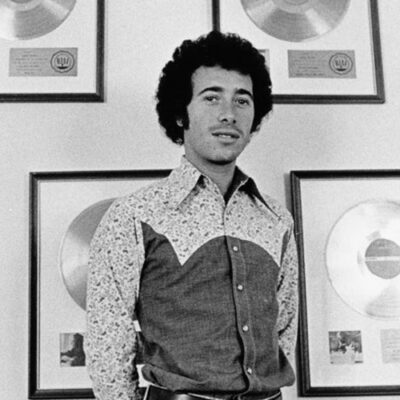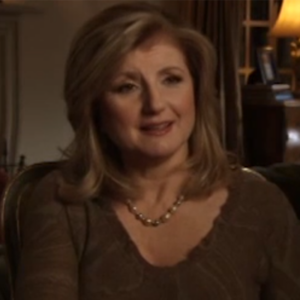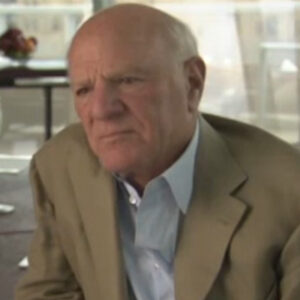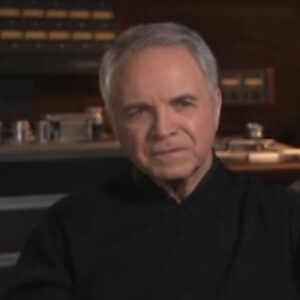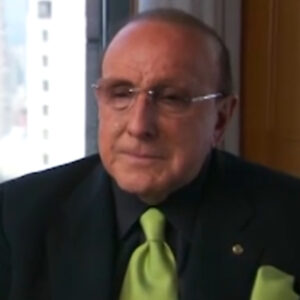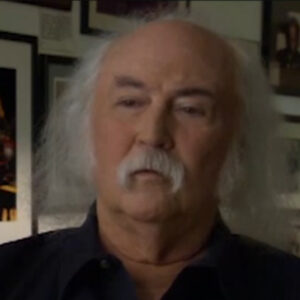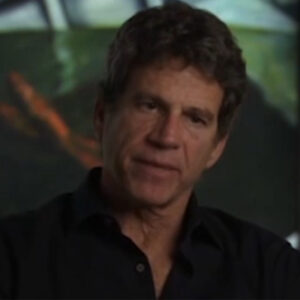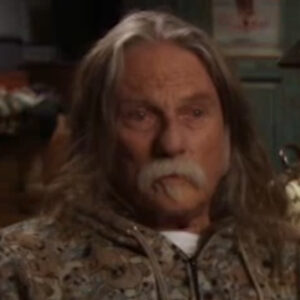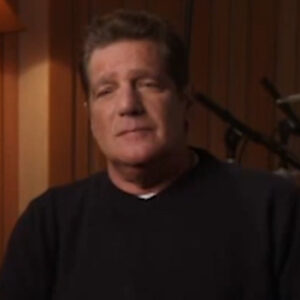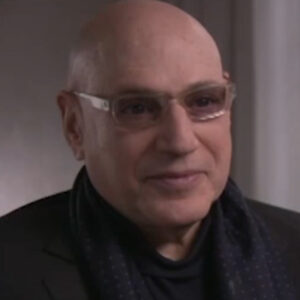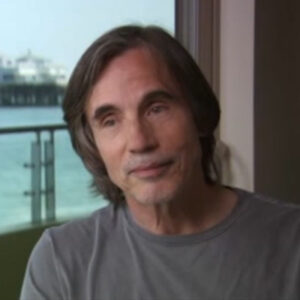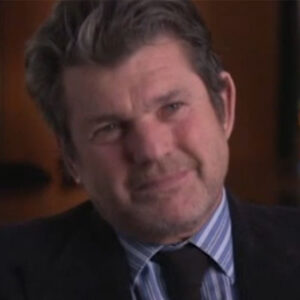Speaker Well, I think, you know, I think that David’s role in in pop music and the recording industry is sort of self-evident. The number of important artists in the heyday of the era of his generation that he shepherded to success talents, he discovered, you know, we can name them all, starting with the Joni Mitchell and Jackson Browne, the Eagles and so on. That’s huge. And of course, most people don’t understand the role that managers or recording executives play in the creation and nurturing of these careers.
Speaker And Crosby, Stills, Nash Young, so many that he was involved with. But the other thing that’s that’s I think particularly special to David is that he also has always been an extremely keen businessman and has as much of a feel for business as he does for the content of pop culture. So the fact that he has. But then he became powerful. And of course, part of that was becoming wealthy was a tribute to his ability to rising from what the William Morris mailroom to the top of the sort of show business hierarchy showed an ability to. Make combinations that would work in that business, to see opportunities, to make consolidations that often would elude a lot of his competitors. And because there really are two parts to successful behind the scenes show business careers on the business side. One is an eye for talent and having good taste, which David also had, and the other is an ability to make things happen, the business side. And this would reach, I think, a sort of apotheosis with the creation of DreamWorks, which was such a radical idea at the time, although it’s something as old as the history of Hollywood going back to the early days of United Artists or whatever, that a combination of talented people would come together and create their own studio. Someone has to make it happen. And he did. And he in a way, that being sort of the culminating thing that he did in show business. All of this is sort of the last gasp of this really high powered, mogul driven show business that’s now become much more a corporate conglomerate ties.
Speaker If that’s a word faceless, be hard for someone to achieve a career like Geffen’s. Now, I think on that scale, in the world of, you know, Time Warner and NewsCorp and Viacom is everyone sort of, you know, a peg in a board. And he really commanded the scene when he chose to.
Speaker Thank you. Are you aware that when he was a child, that his favorite books were reading about mobiles?
Speaker No, but I certainly I can certainly understand that. And but, you know, the interesting thing about David being a mogul is he’s not a mogul in all Hollywood style, although, you know, he lives in very nice houses and has had this wonderful art collection and been involved in philanthropy. He’s unpretentious guy to meet him. It’s he’s far removed from the kind of Louis B Mer. David Selznick, pomp and circumstance. It’s a different generation. You know, he is someone who wears a t shirt and jeans and he’s not he’s not out to be ostentatious. And he doesn’t have, in my experience, a great deal of tolerance for pretension of any kind, including certainly Hollywood pretension, which can be extreme.
Speaker I’ve never said is a very straightforward, very straightforward and lady. There was it was the model. I mean, I don’t know that.
Speaker Well, good luck. My guess is that he like mayor because the mayor was a shrewd businessman not to emulate his grandiosity and personal habits. How do you meet it? You know, I was trying to think of that. I know when I met him, I met him. My guess is he sought me out.
Speaker I definitely met him. When I was working as a movie and television critic at Time magazine in the late 70s, although was before he was involved with those businesses. In fact, I, I remember meeting him right around the time he learned that this supposedly fatal diagnosis, medical diagnosis was was completely false. It was around the period he was teaching at Yale. And we instantly hit it off and have been friends, you know, waxing and waning through the years. But but basically friends ever since to this day.
Speaker When did you become I know you didn’t cover his records. I mean, his asylum records because you didn’t meet till after that. But right after that, he started getting records. Did ever talk to you?
Speaker No, not that I remember in the broadest terms, but no, I don’t remember ever talking to him in a depth about the record industry.
Speaker And I never covered the record industry.
Speaker So let’s talk about Broadway and his involvement, his involvement.
Speaker Broadway was high class and brief, but I would say a really is a relatively minor. Part of his career was concentrated in a very short period of time when he invested in with, you know, great sense, as it turned out, some extremely commercial shows, including cats, Dreamgirls in the off Broadway hit.
Speaker Little Shop of Horrors. He also invested in and played it. I think maybe a slightly more active role in in producing some straight plays that were critical successes, even if they were very in commercial sex success the most. The one I think that he may have been most involved in was M. Butterfly, which was, of course, a Tony Award winning play by David Henry Wong and sort of a classic of the modern theater. But I know we had a hand in at least the Broadway transfers of Athol Fugard play Master Harold in The Boys and Good, which was a flop, but sort of a success, this team. In the case of Cats. Dreamgirls and Little Shop. He was not the lead producer, nor could he be the lead producer with the Shubert’s then and now the most powerful force in the theater. And if people if you ask people who produce those shows, they would say the Shubert’s. And indeed, my guess is that with the exception of Dreamgirls, where David had a even then I think of friendship and creative relationship with Michael Bennett, who directed it. I don’t, you know, cast it simply moved as a hit from London to New York. So he was an investor in it. You should ask him this, but I think the reason that he got out of it was, first of all, it’s very small scale compared to other businesses he’s in, although he’s obviously interested in the theatre this day and, you know, at least dabbles with it, certainly goes to it. And also because he couldn’t have the kind of control that you can have in those other fields, because the theatre is such a Broadway theater. It’s a very tiny industry. And the people who really control the people in the real estate and the Shubert’s own 18 or 19 of the thirty six or so Broadway houses and that’s it. And so I think it’s a creative experience was probably. He’d have to say this from self. But my guess is he would rank it as how much he loved the individual shows of the material. A lesser part of his creative life.
Speaker That’s an excellent answer. I imagine it’s exactly true.
Speaker And by the way, it all has a very concentrated. Can I say something off the record? On camera. I mean, he felt he was being cheated by the Shubert’s as a lot of people did. You know that they were a team of red? Well, not only charging, too, you know. You know, we can’t say this on camera, but they charge everything against the production.
Speaker I think he had some accounting issues on some of it and, you know, control over it. And it really was run like a fiefdom. And so what do you need for a falling out with Bernie Jacobs?
Speaker I know that.
Speaker Right. And Bernie was the person who ran it. And and it was and it was probably over who had control and also who control the box. But we can’t say this because it raises questions of legality. So this is off the record. But but, you know, there were in those days, particularly less so now.
Speaker There were often bookkeeping questions about Broadway theater owners and shows and not just the Shubert’s and not just the shows. David was involved with. So he had a special relationship with Jay Schulberg. Schoenfeld. You ask him about that?
Speaker He was very distressed that I hadn’t gotten to him before he died.
Speaker I know that that’s interesting. I know I’ve known Jerry. I’ve known very long and I’ve known of Geffen. I’d been him as a child, as a friend of my parents.
Speaker Off the record, I don’t think he would have added anything. He would have said, oh, I love David. And he was sort of an amiable blowhard, but the real power was Bernie. And so, you know, have you had trouble finding people in the theater who could who were there could speak about it?
Speaker You’re the first person that it might be worth.
Speaker Ask David if he thinks it’s a good idea. David Henry Wong, who is brilliant, is very much around. And that is. And that’s where. As I understand it, Gaffin played an actual was able because it didn’t involve the Shubert’s. It was had nothing to do with that. He played a real role. And in some ways, it’s it’s the it’s the most creative producing assignment he had because he wasn’t. They were bringing cats over from London. You know what I mean?
Speaker And it wasn’t a musical. And David is very much around. Very much. A bunch of projects in the theater in New York. And it might be worth it. And probably David Geffen could tell you whether David knows.
Speaker Nice to meet you.
Speaker John Breglio. John John’s a great person to talk to. And he John was Michael Bennett’s lawyer and executor. Also an old friend of mine. I wonder if I met David through John. I don’t know. But I’ve known John long before both of our careers began. I knew him since I got out of college. John was in all these deals and so he’ll be very good. He’d tell you much more than Jerry Schoenfeld. So, yes. So go to John and John, of course, very involved as to this day, Michael Bennett’s representative in all things Dreamgirls, including the movie, which sort of Lord David back into getting actively involved in film. And then David Wong, who who’s really smart and articulate, might be not not great. You know, he’s a very solid guy.
Speaker And it suggests. Yeah. And is it true or is it is apocryphal, the David Mandingos.
Speaker I never heard that. So I don’t know. This part, it’s entirely possible. But that’s something John would know in a second.
Speaker I think it was going to be called.
Speaker And I’m sure you dream. I’m sure it had many titles, as all these shows did. You know, Oklahoma was called Away We Go.
Speaker So it was it was called that when it opened in Boston out of town. So all these shows had maybe castles, always called cats.
Speaker But T.S. Eliot. Yeah. But now I would be called out would be called and then I would be called Betty Buckley’s cat.
Speaker But but the thing is that John would know better than anyone.
Speaker If Dreamgirls was whose title was whether was Tom Irons or or Bennetts or Davids or Henry Krieger’s or whatever.
Speaker Let’s talk a little bit about that, David. When they introduced him, the benefit publicly was the captain of industry Sullivan.
Speaker Yeah, I do. I think that well, David is a business man. He’s a very accomplished, thoughtful businessman. And by that, I mean, he’s not just the it’s not the cliche of the mogul. He actually understands how capital works. He understands investments. He he has a business interests that are not just in show business. He sees he sees the big picture. And yet he absolutely loves the arts and and and cares about them passionately and feels them keenly. If he didn’t, he couldn’t have had the career he had because it’s not as if he’s making, you know, fifteen sequels to tentpole movies aimed at 15 year old boys, which which had been the basis for many successful careers in Hollywood, where he’s churning out schlock to feed lowest common denominator.
Speaker He’s always been attracted to artists who in the test of time shows this, who have been special.
Speaker You know, someone like Joni Mitchell has never that he helped turn into a mass artist, but really would be considered one of the preeminent people in our music over the past few decades. The same would be true, I think, of Crosby, Stills, Nash and Young in their various iterations and and others. And the same time in his film career. It’s been material. I’m sure some of it’s not great, which is true of any anyone in his role.
Speaker But but movies like I think of like early on, like Risky Business or even Beetlejuice, they’re eccentric, somebody’s idiosyncratic projects. And that’s true of some of his theatre works, really, M. Butterfly. And even DreamWorks was in its time considered an experimental show. So he’s saying it’s okay.
Speaker Could you do that again? Yeah. Girls.
Speaker Yeah. And even, you know, even Dream Girls. And it’s time was considered experimental show and by the way, got a lot of bad reviews and lost the Tony Award. It was it was it was out there. It was daring. Now it’s considered a classic, but it wasn’t when David was first involved with the Shubert’s and producing it. So that’s different from a lot of it’s not unique, but a lot of show business mogul careers have been about catering to the lowest common denominator.
Speaker Seeing how many ways we can, you know, slice transformers or whatever and dice it and re merchandise it. And that’s never been his way. And even and as sometimes happens in show business, taste and even idiosyncratic and very highly personal tastes can result in financial success. And, you know, there’s nothing wrong with the Beatles because they they haven’t become hugely successful. Shrek might be an example of that in films, which was a project that I know he heard about it to DreamWorks. And sometimes David’s done things just for the good of them to do. Athol Fugard. Master Harold, the boys put money in that. There’s no way in the world that could have ever been a commercial project that was known going in. It was something that was moved from the Yale School of Drama to Broadway by a South African playwright. It’s a classic of the modern theatre. It was destined to run a season or it did, and that wasn’t the point.
Speaker So you’d say that it’s just it’s God’s choice of material.
Speaker As far as I know, David’s always trusted his guts. And by the way, that’s true of almost every successful person who’s a producer and entrepreneur in show business. But it’s not just that you can trust your guts.
Speaker And, you know, Jim Aubrey, the famous CBS executive filing COBRA, worked for Bill Paley in the 60s. He trusted his godson, produced, you know, The Beverly Hillbillies and Green Acres and, you know, schlocky sitcoms that kind of tarnished the brand of the network but were hugely successful.
Speaker You can trust your guts and and produce Beanie Babies.
Speaker David trusts his guts and actually had good taste and produced stuff that’s had a lasting effect on the culture and has a life beyond the immediate moment where it succeeds or fails with mass public.
Speaker I I’m trying to get at this the soul of the artist a little bit because I think there was a young David that started, you know, creative forward into the grand piano and instinct and the town to Broadway and scalped tickets and well, you know, dreamed of.
Speaker Look, I think it’s there and, you know, I obviously didn’t know him there then and I. Did not know him during the record producing period, which obviously really exemplifies this. But I can give you one example. I was in Los Angeles this summer that the movie of Dreamgirls was being cut and finished. And I had been a week lot of socializing.
Speaker My wife and I with with David during that period, the intensity with which he was concerned about every aesthetic decision with that movie was just astonishing. And the attention to detail now, it wasn’t about if we do it this way, will it make more money? Will it do. This way? Will we sell it to this person? It was about, you know, does this scene work? Does this no work would be better if we did more of this and less of that. You know, and. It was astonishing to see his preoccupation with it. And it was the preoccupation of someone who might have could have been his first project 40 years ago. And it was that level of enthusiasm, intensity, involvement and also devotion to the vision of the artist who really created it, who was no longer alive. Michael Bennett, who created the Broadway show and whose memory he wanted to serve in a Apel poll as an artist.
Speaker Just see here, because I know we got I mean, if I have that much more to say, but I think we’ve talked a little bit.
Speaker I think we’ve kind of done Broadway. That’s good. You’ve done an absolute wonderful job. There is a quote I wanted to meet.
Speaker I’m doing well. I’m barely a kid has this job. It’s not arrogance. I get to decide what people like Gift is knowing what will be a success, the forces of success. I’m not Sammy Glick. I’ve never killed anyone. I don’t have to challenge you.
Speaker I never I don’t remember that. You know, I think. What does that mean? I think. I’m sure that’s all true.
Speaker But it’s real. He’s really there talking about the record industry stuff. And I just don’t know it well enough. You really need and I’m sure you have them people who are around for that, because that’s what he’s really taught me. He was just beginning his little excursion to Broadway and Cats. With all due respect, that was a huge hit in London where he just did invest in the Shubert’s Decide Society move in and they let him into it. So he’s what he’s really referring to there is his record career. Given the timing that because his movie career is also just beginning.
Speaker So I know I’m sure it’s all true, but I can’t get chapter and verse.
Speaker It’s showing a credible sense of competence.
Speaker Well, I do.
Speaker I do think one thing about David that I find really appealing, and not just in terms of his show business career, but in life as a person, is he is not one of these people in Hollywood who is looking over his shoulder constantly and wondering what will people think or what is the pack going to do? He very much has stuck to his guns. And that includes everything from, you know, tapes in show business to politics, obviously, to how he lives his life. You know that he lives it. You know, he has an informal manner. He doesn’t care what people think.
Speaker And the problem in show business particularly is when someone in sort of David’s role or producer or showbiz mogul or entrepreneur becomes a slave or might one say a horror to what he thinks or she thinks the mass public wants. It’s the death of culture and usually the death of that career, because if you just constantly pander and and try to think, oh, this audience really loves this kind of garbage, and I may think it’s garbage, but I’m going to give it to him. You may succeed once or twice. You won’t succeed over the long haul. The career to having the secret, to having a career with a long G.V. that Geffen has had is that he sticks to his vision of what he wants and his own taste. And 50 people can tell him.
Speaker And we’re watching this when he was getting results from, you know, screenings and pre screenings to ordinary ticket buyers of Dreamgirls. The cards could all say, we love X, and if he didn’t like X, he would still fix X.
Speaker And that is a crucial ability to have to have in any walk of life. But certainly in show business where you’re so dependent on what the mass audience thinks and it’s hard to do.
Speaker You know, I learned this is probably completely irrelevant to the film, but when I was a kid, I was a I was a ticket taker at a Broadway tryout house and shows were coming in on their way to Broadway and they’d get good reviews or better view of the audiences would like them or not like them. But the really smart people tuned it out and did what they wanted to do anyway. So for me, formative experiences we’re seeing as a teenager seeing Mike Nichols and Neil Simon with the Odd Couple in Washington, D.C., trying out and it was it. Audiences loved it. They wanted from the beginning, but they still kept changing when the Pigeon Sisters came or didn’t come in the second act. Fiddler on the Roof on a train. And Jerry Robbins threw out two numbers, even though it was a hit, because even though the audience was saying this great, well, that’s what these people had.
Speaker And that’s, you know, just an illustration of the quality that David has to tune out the mob and around him and the clerks and stick to his guns.
Speaker And artistically, because, you know, if David would have just made a lot of money, we would not be making that cultural influence.
Speaker So it’s really well, you know, why have we heard of David Geffen? It’s not because of, you know, his remarks about politicians. It’s not about really is philanthropy all that’s impressive or the fact that, you know, he was openly gay before that was really completely accepted in Hollywood. It really isn’t about any of that. It isn’t and isn’t about. He was once linked to sharing that. It is about the durability of the work and the fact that there’s been a consistency to it over decades in virtually every show business media, with the possible exception of tell us how things have worked in television. But he’s worked, obviously. Usually in music, in film, to some extent in the theater, and there’s been a consistent level that’s associated with him and there’s been plenty of people who in show business who have been producers, mobiles, who have, you know, gone like comets through celebrity, through gossip columns, through glossy magazines, notoriety or whatever that are completely forgotten now or forgotten 10 minutes. After all, this happens because the work isn’t interesting and or it’s their one hit wonders. They have two or three successes in their Kraven successes. It’s very, very hard to pull it off. And there aren’t many who’ve done it over so consistent a period film consistently over so long a period of time in show business, which, as we know, is one of the most treacherous, cutthroat. What have you done for me lately? Kind of businesses that have that kind of longevity? Based on the work, not just on making a lot of money is rare.
Speaker Yes. However.
Speaker Being the successful guy in show business has sort of propelled him into being a player on the world stage, a very interesting way he can influence politics. Talk about your time.
Speaker Yeah, I think so. I think he would.
Speaker You should ask him about, as I’m sure you will. I don’t think he would describe himself as influential in that way. I do think he’s certainly certainly had influence as a contributor to politicians. But I don’t think he’s ever wanted to have any real influence over policy or, you know, it’s not his his thing. You know, he has strong views, as we all do. I do think, obviously, his infatuation with then falling out with the Clintons has been of, you know, has made some headline news. Now, why? It’s not like he’s the only one or the only one in Hollywood who got involved, the Clintons or even was disillusioned by the Clintons. But it’s because he’s fearless about saying exactly what he thinks. When reporters run, he does not censor himself. And my my wife, Alex Witchel, before we were married, she covered the theater, the Broadway theater as a reporter for the Times when Geffen was in it. And she told me later, before I knew her, that he was a rare example, maybe one of two that she could think of in show business, who would always tell her the truth on a story even when it wasn’t in his own interest, which is just kind of amazing.
Speaker And that is so unusual for any journalist who’s ever covered SHOWBIZ’s. I never covered David that way, so I didn’t have that experience myself. I never wrote about him. But he would say, oh, you know, maybe off the record or maybe on the record, you know, we screwed this up if they screwed it up. And it wasn’t about back biting other people.
Speaker You know, his Monterrey’s. You’re as sick as your secrets.
Speaker Well, that’s. I never heard him say it, but, yeah, he’s he’s he’s pretty much an open book. He is. He is someone you know, I think it’s I think one reason why people are so engaged. I’m always meeting people who’ve met him for the first time for some reason, you know, obviously people not in show business, he’s he’s direct and he’s open and he just doesn’t have secrets. And he’s also funny, you know, he which is such an underrated attribute, including in show business. He’s he’s witty about everything and can be hilarious.
Speaker He’s great company in that way. Well, maybe you should be doing the interviews with him because. Oh, have you not done them yet? Or you done one interview with him so far? I mean, we’re talking to lots of people. He’s not comfortable with the interview process. It’s just it’s interesting.
Speaker You know, he did do one of the 90 second street. Why that was the one where he said something about Hillary. I can’t remember any when he first said he’d had enough for the Clintons. I can’t remember anyway. It made the papers at the time. He was interviewed by Steve Shepard, who’s now the head of the CUNY Journalism Schools and the editor of BusinessWeek, wasn’t that long ago. It had to be three or four years from term, about time. I bet they have an archival recording of it. You should look at it. It might be helpful.
Speaker I was amazed that he did it because he does have this mean he’ll talk to the press all the time. But this idea of sort of being on stage in the center of attention so like he’s retiring or shy is not, but just not his thing. It’s didn’t witness and had no emotional investment. I know him then.
Speaker So you think beggars can’t begin to think that a lot of it is quite baseless, that there’s a lot of envy involved in because in this business, you’ve started you same age as all these young people who were starting and then he kind of was done and got really, really rich.
Speaker So I think some of it said, well, you know, that that’s when it would have been, because in terms of the movie business and the theater business, it just wasn’t that kind of situation to their top people. Talking about the music business. Eyewitnesses. I didn’t I didn’t know it for free. I know it’s true. But this much I can tell you, Mike Ovitz is an authority on nothing. Anything he says, you know, but he wasn’t even involved in the music business.
Speaker And so the people I’d be interested to hear the other people. Who were around its history? I just don’t know.
Speaker Well, I think that David hit. I think David is. He’s not only an open book and he tells the truth. He tells the truth no matter what he’s talking about. I mean.
Speaker Oh, absolutely. That makes enemies. Because. Because I just want to hear that. No.
Speaker In Hollywood, people, you know, love to obfuscate and be phony. And he’s just not that kind of kind of person, you know? He’s only a movie that’s boring. He’s going to say it’s boring.
Speaker You know, he didn’t play the Hollywood game night, which is why when he was for a very brief time, the studio executives didn’t work out.
Speaker But that’s also I don’t think I knew that because he just did not play right. He didn’t play so. Right. Right. I just have a couple more questions.
Speaker And you may or may not want to talk about it. When I’ve just you’ve written a lot about the game and I’m just wondering if you could kind of set the stage for, you know, where they came out.
Speaker It was really early and and it was at a time where the entertainment industry was being decimated.
Speaker You know, I’m not I’m really not. I know what you’re looking for, but I’m really not the best person to give you the context because I wasn’t in L.A. and it was. When was it? It was the early 1990s. You really need someone who is close that could keep in mind. AIDS had come about a decade before. So where that timing fits in Hollywood and how it differs from an executive as opposed to a performer. I feel uncomfortable setting the context for that. He’s not in my coverage of the gay civil rights movement. He’s not been a figure in the kind of coverage I’ve done. So I just don’t feel I have the expertise. It’d be very interesting to talk to, you know, the Howard Bragman type, the people out there who are very they’re not they’re not in any velvet mafia, but to particularly younger, I would think, the many younger gay out executives right now. That’s what I’d like to hear from, you know, like, you know, his friends. I don’t even know under the name Max much Nick. He’s a he’s a, um, maybe slightly garbling the name, but he’s I know he’s a friend of David’s, but he’s he’s the guy I think who created Will and Grace. So he’s like the next generation. He’s like the producer of that. Exactly. That’s the kind of person they’ll be meaningful.
Speaker Or Brian Lord, the CIA agent. The people who are a generation behind him. What it meant to them. That’s what I’d like to hear.
Speaker My coverage is so much focused on on Washington and and not that. And and so I just I feel I’d be tone deaf on it.
Speaker But wasn’t that a little bit? Not certainly not all of it, but a little bit of his disillusionment with Clinton.
Speaker Don’t you know, it’s interesting? I don’t know a lot of gay supporters of Clinton were disillusioned about don’t ask, don’t tell in Defense of Marriage Act. But I’m not I’m not sure that those were the big things. In David’s case. I I don’t remember him talking about it. I think it happened later. But you should ask him. Interestingly, in that period, most Clinton supporters, gay Clinton supporters, remain loyal to Clinton through that end. And indeed, and this is unlike David supported Hillary Clinton in the last campaign over Obama. So I don’t I don’t remember now that everyone is rightfully and should be angry about how Clinton sold gay people out at that time.
Speaker But I don’t I don’t know if that was a big factor. I think there are other things that maybe even bigger issues and not bigger issues, but different issues that happen a little bit later, because that was very early in the Clinton administration.
Speaker And I think his falling out with Clinton’s happened later. Don’t ask, don’t tell was the first few months. And I don’t think that had a rupture by then.
Speaker Well, maybe the beginning of this, I don’t know.
Speaker I mean, you got to ask him.
Speaker Yeah, I know. We can’t obviously say that David got Obama elected. But he certainly had a huge influence in leading the way of Hollywood towards Obama and away from Hillary. Can you talk about.
Speaker I’m not. Again, I’m not the best person. You’re probably right. But it’s just something I’m not conversant because I just because I’m not out there. And it be interesting it would be interesting to talk to someone like Marilyn Bergman or Rob Reiner, one of these people very active in Democratic politics. Gary Ross, the director I know, is Big John Edwards supporter, because I think you’re probably right that it helped turn the tide from a very Clintons centric but didn’t turn everyone like I think Steve being the big Clinton supporter, is also a good friend of Geffen’s. So I don’t know if the premise is true. It be interesting to hear them on it because I’m just too far removed from it. As I say, I was caught up.
Speaker Did you know that Maureen Dowd?
Speaker Only when it was published. But it was. But it was certainly nothing that I hadn’t heard a version of from David or any. I think anyone who knew him had her him. And that’s I think it’s a he said a version of it in the Steve Shepard interview on stage. And that’s why it made the papers like it made the Daily News or something a couple of years earlier because he was definitely disillusioned with the Clintons by the time they left office. So it was not. It was. I think anyone who knew David was not unexpected. It was unexpected to hear him have that opinion.
Speaker Just one more question to. What did you think about his bid by the new. Where do you think it came?
Speaker I don’t think he has bid to buy The New York Times, has he?
Speaker Well, it is by trying to buy into it.
Speaker Well, what I read was that he. There’s a 20 percent share that he was interested in making an offer for. But it’s not a controlling share. In the end, he didn’t make the offer because he thought it was overpriced. And I just I haven’t discussed it with him. So I only know what I read in the paper. So to my knowledge, he doesn’t have a bid to buy the Times. Should probably be careful with that. Also, The New York Times isn’t for sale because it’s controlled by the controlling stock is on is owned by the family that owns it. So you can’t put up a bid to buy The New York Times. He is a huge fan of newspapers and a huge fan of this paper and never as reader of journalism. You know, he’s a big reader of The Economist. You obviously did have an interest at one point, a strong interest in the L.A. Times, but the New York Times situation, I think, is more ambiguous.
Speaker I agree with you because I’ve read. I mean, even he said to me, this is making a bigger deal.
Speaker Yeah. You know, look, I say he cares about The New York Times. I know that. But I don’t I I think it really would be overstating the case to say he’s a it’s not for sale and B, hasn’t made a bid to buy it. If in the very unlikely event that the founding family would want to sell it, would he be interested? Who knows? But because it could be it may never happen.
Speaker It’s too hypothetical to answer the articles at the time of him that he would like to have gotten some kind of a controlling share in it turned into properties.
Speaker He has said that publicly, but you can’t get a controlling share. See, the way the Times works is there are two kinds of stock. The only stock available in the. Market that he could buy or you or I could buy has no control. So if there’s an ace talking to The Washington Post is run the same way. The Graham family has a controlling stock there. And The Wall Street Journal had the same exactly the same structure. All three of the three major papers all had the structure. The L.A. Times once did, but its old self. The Chandler family sold it to the Tribune Company. So in the case of the reason why The Wall Street Journal could be bought by Rupert Murdoch was because the founding family decided to sell short of the Graham’s making. That decision about The Washington Post to the Sulzberger is making that decision about the Times. It’s not going to happen. So it’s completely hypothetical. He’s as David has said publicly and I’m sure a lot of people agree with him in or in and around journalism, that papers the quality of the times would could be well served by being in a nonprofit setup where they’re not dependent on stockholders because the stock, while those stockholders controlling interests, they do have no financial interest in it and and can try to apply pressure.
Speaker Question. He’s a good friend of yours. What do you talk about?
Speaker What are we talking about? When I’d say anything from show business, things we’ve seen to books, to the news, to politics, to friends we have in common, to characters that we know in common, to the state of the world. All of that, you know, he’s he’s he’s an engaging, funny conversationalist.
Speaker And, you know, so it’s like talking to someone about what would you read in the paper that day or what movie did you see last week? Or do you think this is going to be a hit or a flop?
Speaker Because the vulnerabilities.
Speaker I’m sure he does, but I’m I’m not sure I’m privy to what they are. But he he’s somebody who is used to getting his own way, but not in a in a majestic kind of pompous way at all. He likes he likes to win.
Speaker And my guess is that I haven’t seen that happen much, if at all. But my guess is gayly, when he loses something he wants, he’s not happy about it. But I’ve I’ve known him only in the second half, I guess, of of his career. And he seems to pretty much have done what he wanted to do and had a lot of fun doing it, actually going into it.
Speaker Terrorism a little different. It’s kind of to me dichotomy that this man who has just kicked out game and he’s won everything he’s got everything he wanted a total self-confidence, but was terrified to make a speech in that articles memorial practice in front of all his friends.
Speaker That’s a side of him. I find it endearing. I did, too. But I didn’t know about that side of it. And I didn’t even know that until you told me.
Speaker But no, it’s interesting because in private, he’s completely outgoing and not at all shy and funny and talkative so that if he has a problem with public speaking, it never even occurred to me. You know, I guess I’ve never seen him really speak publicly, but it’s something he’s ever talked about. And it’s interesting, but it’s not something that I even knew about.

